A one-of-its-kind proactive space for preventive healthcare that provides exercise advisory, the newly-opened Heartbeat @ Bedok Active Health Centre reaches out to people who aspire to own their health and to celebrate being alive and well.
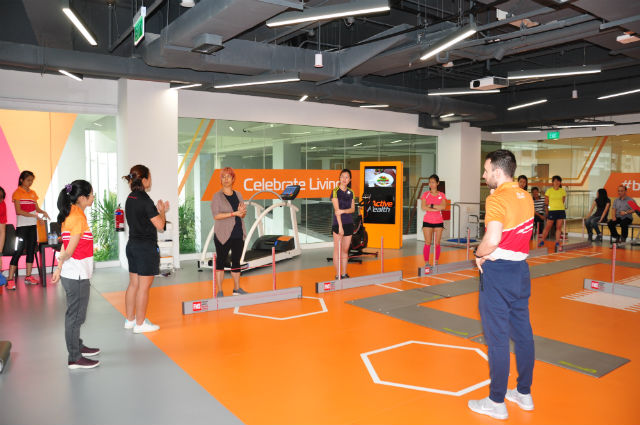
Singapore’s first Active Health Lab opened at Our Tampines Hub on 6 August last year and today, the second and largest Lab just opened at Heartbeat @ Bedok. Here, people can find out more about how to take ownership of their health through this space.
The Active Health initiative
A social movement that enables everyone to live life to the fullest, the Active Health initiative, which is operated by Sport Singapore, focuses on four key health and wellness domains – these are Physical activity, Screen Time, Sleep and Healthy Eating.
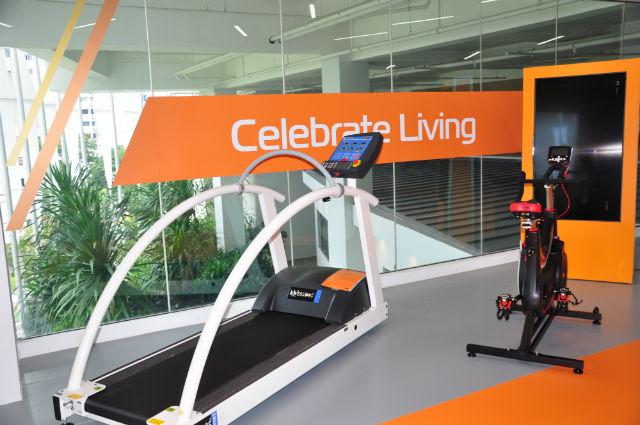
And in years to come, Sport Singapore hopes that Active Health can be supported by an island wide network of Active Health labs – that will be complemented by mobile technology, sporting spaces and programmes.
People need to take charge of their health
Said Dr Chiang Hock Woon, Deputy Chief Executive Officer of Sport Singapore, “People need to take charge of their own health to be sustainable. But for Singaporeans to take charge of their health, the social element needs to be there. We can’t do it by ourselves and it’s not possible overnight. We have to have friends and family around us, and our social circles are important. At Active Health, we encourage people to own their health.”
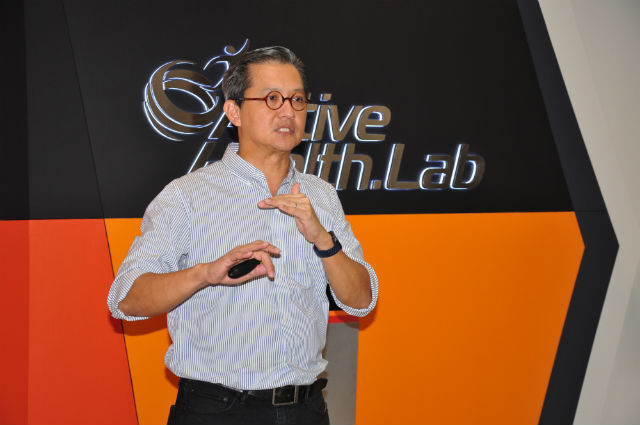
Invited to the media preview of the Heartbeat @ Bedok health lab
I was recently invited to the media preview of the Heartbeat @ Bedok Active Health Lab, where I underwent an on-boarding session.
Designed for group based assessments of up to 20 people, an on-boarding session gives participants a holistic understanding of their health, equipping them with the knowledge to manage their health and fitness levels. They will also be able to pick up tips on how to progressively make small changes towards better health and wellness.
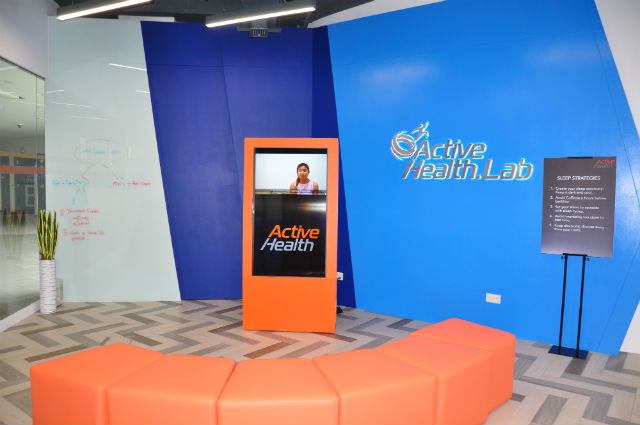
Said Dr Chiang, “The on-boarding process helps you to understand your fitness better and to pick up simple health habits to suit your lifestyle.”
He added, “As we age too, we need to do different things to stay healthy. The Active Health Lab is designed for people who need curated exercise, to come down and better understand themselves and their state of health.”
My on-boarding process
I found the on-boarding process, which can take anywhere from about 15 – 30 minutes depending on the size of the crowd, to be insightful and interesting.
Prior to the session, we were tasked with filling out a screening form where we had to indicate whether we have any pre-conditions such as heart surgery, diabetes, renal disease or heart valve disease, that may rule us out from participating in physical activity.
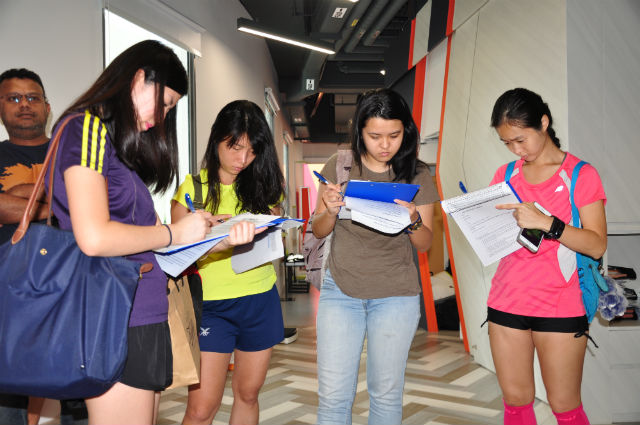
Those who have such conditions may require medical clearance to take part in certain types of exercise or sports, depending on their current fitness levels.
As well, we were also asked to indicate whether we are currently taking part in any physical activity.
According to Sport Singapore, their definition of physical activity refers to structured physical activity for at least 30 minutes at moderate intensity on at least three days of the week, for the last three months. Moderate activity refers to being able to talk, but you cannot sing at ease.
As I am a marathon runner and a triathlete, this description definitely more than applies to me.
Besides moderate, there is also vigorous physical activity, where you are not able to talk at all, or light physical activity, where you can talk and sing with ease during the activity.
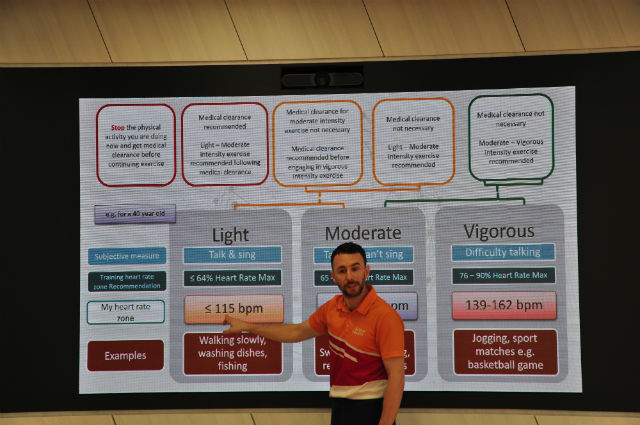
Measurement and assessment of body composition
At the on-boarding session, we learnt how to measure our own blood pressure, hip to waist ratio and received a personalised reading of health parameters using a Bio-Electrical Impedance Analysis (BIA) which assesses body composition such as body fat percentage and muscle mass.
I found the blood pressure measurement and hip to waist ratio measurements to be quite simple. I also discovered that my blood pressure was lower than average – even though I did not feel dizzy or faint at any time during the measurement process.
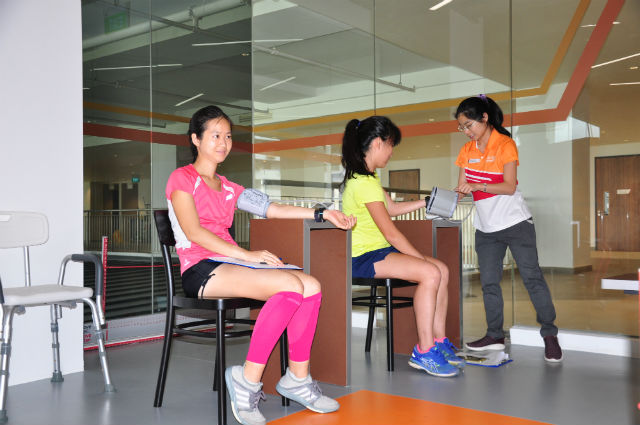
However this is quite normal according to the Sport Singapore professionals who had been conducting the measurement – as ladies generally have lower blood pressure than what the optimum standard is supposed to be. But as long as we are not feeling particularly light-headed, then that is not a problem.
For the BIA analysis, the Sport Singapore professionals basically remarked that I am quite healthy. For example, my vital statistics such as my weight, body mass index and percentage of body fat are all in the lower end of the healthy range. Together with my blood pressure readings and my hip to waist ratio readings, all of this puts me well within the healthy range. So looking at my readings, I suppose this shows that I am currently in good health.
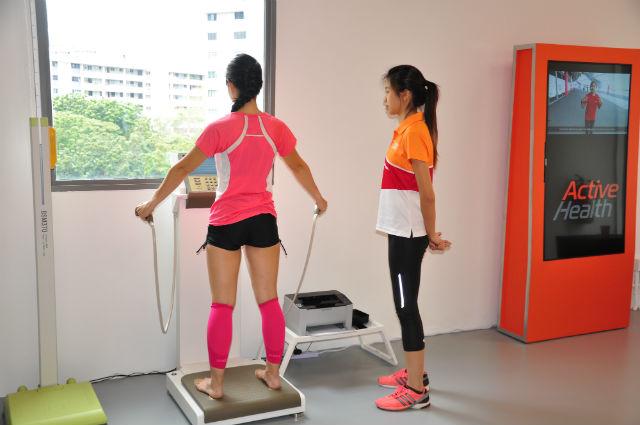
The Sport Singapore guys, however, did point out that each of these values cannot be taken in isolation to determine how healthy a person is – this is because for example, a person may have a high body mass index, but if he or she is particularly muscular in his or her body build, then this is not a problem.
I must state that using the BIA machine requires you to take your shoes and socks off, and stand onto and hold the machine – to let the electrodes pass through your body. So as such, this machine is not recommended for use for certain groups of people – for example, those who have pacemakers implanted in their bodies, or for pregnant women.
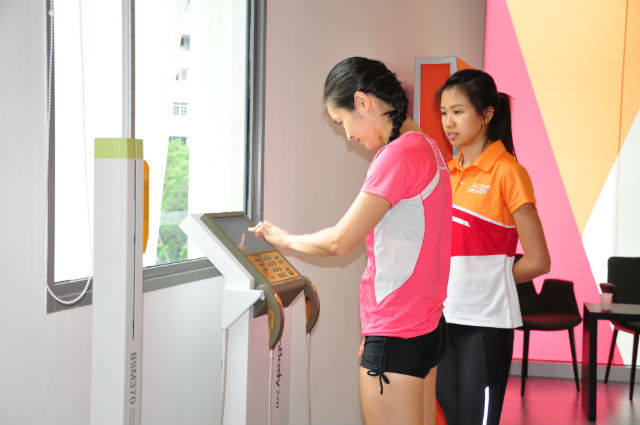
Besides these values, the BIA machine also tells you the amount of fat and muscle you have on various parts of your body, such as your right arm, left arm, right leg and trunk.
This is useful because it gives you an idea of where the imbalances may be, in your body and what areas you can consider working on more – for example if you are a marathon runner, you may have more muscle on your legs rather than your arms.
From the BIA machine, you would also receive an in-body score that is a reflection of your body composition and some recommendations on your target weight, as well as optimum fat and muscle content.
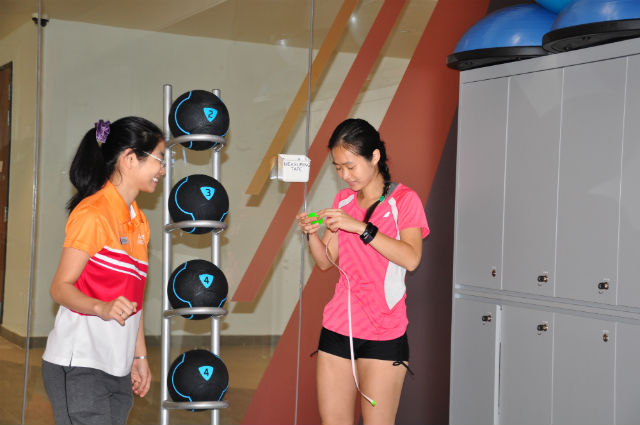
Estimates your heart-rate zones for physical activity
Once the BIA assessment, which takes about five minutes per person, is complete, a staff member from Sport Singapore, will look through your readings and help you calculate your estimated heart rate zones for exercise purposes – by using the formula 220 minus your age.
By using your heart rate zones, this is supposed to indicate whether the physical activity that you are doing is light, moderate or vigorous and you are supposed to work within your heart rate zones. You are also recommended to get a simple activity tracker to determine what heart rate zone you are working out at.
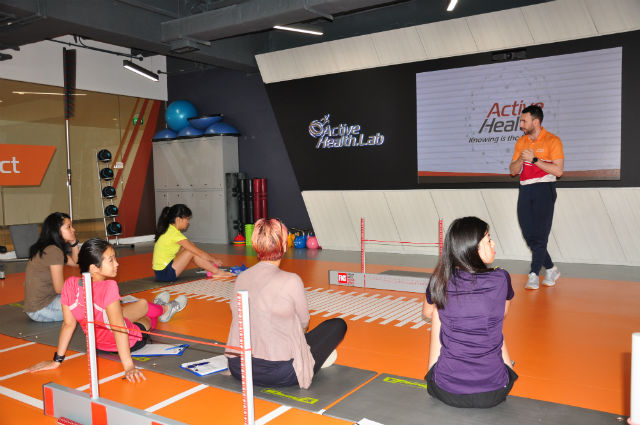
Said Dr Chiang, “Nobody can design an exercise programme to suit everyone. You need to look at everyone and customise an exercise programme tailored for that person. For example, an obese person may not be able to run because of knee or back problems, so they may be better off doing light workouts such as yoga.”
Encouraged to make lifestyle changes
Based on the assessment, we are then strongly encouraged to make lifestyle changes to improve our health and state of well being. These are termed as the Active Health 16 Habits and fall within the categories of Physical Activity, Screen Time, Sleep and Healthy Eating.
Some of the habits include using the stairs instead of the escalator, making it a point to reach 10,000 steps per day, taking one 30-minute screen break during the day, turning off all alerts on your mobile phone before bed and making sure that you eat two servings of fruit and two servings of vegetables every day.
Functional mobility assessments
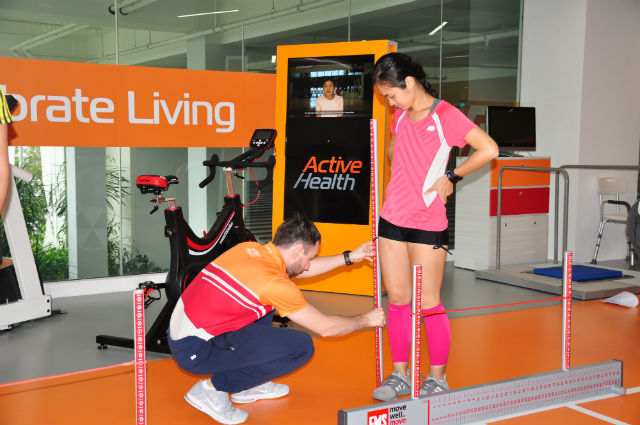
Following the on-boarding process, members of the media were also given a taste of functional mobility assessments that Sport Singapore also conducts.
These assessments are part of the Functional Movement Screening test, which involves seven movements that will give you a gauge on the imbalances between your left and right limbs, and any other parts of the body that may benefit from strengthening programmes.
During our simple assessment, we tried our hand at going over a simple hurdle. To reach the highest grade at this assessment, we had to keep our bodies straight and upright as we crossed the hurdle. It would be immediately failure if we make contact with the hurdle.
This was not the easiest activity for me to accomplish, because I feel that the muscles in my legs are quite tight from the running that I do! But I still think that I had managed okay, though!
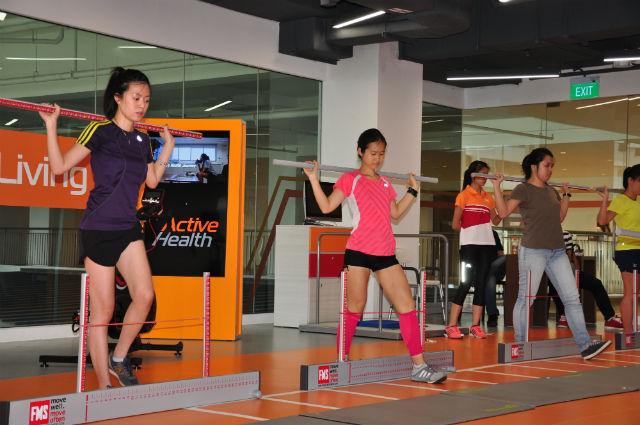
Other fitness tests available
Other fitness assessments include the cardio respiratory fitness test, the handgrip strength and the Y-Balance test.
The cardio respiratory fitness test measures the estimated VO2max (ml per kg) or the body’s ability to consume oxygen and deliver it to the cells every minute. Knowing this can assist with the development of a training programme or understand the risks of common health conditions associated with a low fitness level.
This test is performed on a treadmill, running track, bike or based on the number of steps depending on the person’s baseline fitness level or preferred exercise method.
The handgrip strength assessment is measured using one set of localised muscles – for example, the muscles in the forearm. This is used as an indication of a person’s total body strength.
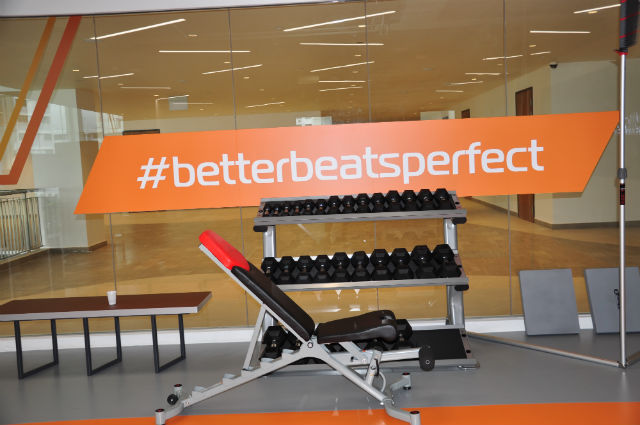
On the other hand, the Y-Balance Test helps individuals to understand their balance based on various planes of motion, and gives you a better understanding of your risk of injuries during sports.
For all of these sessions, I could see a wide range of equipment for use at the Active Health Lab and these ranged from a treadmill, to kettlebells and dumbbells. So this had really reminded me of a fully-fledged gym.
Themed classes
To continue to engage Singaporeans after their on-boarding process and tests are complete, Sport Singapore will also organise themed classes and workshops at the Heartbeat @ Bedok Active Health Lab that focuses on three core areas – physical activity, sleep and nutrition.
Said Dr Chiang, “The Active Health Clinics are essentially for teaching you how to do certain exercises and make small lifestyle changes, in order to live more healthily.”
These physical activity sessions give attendees access to sports tools, expert methods and scientific knowledge that are usually only accessible to high performance athletes, to help you meet your goals in your chosen sports.
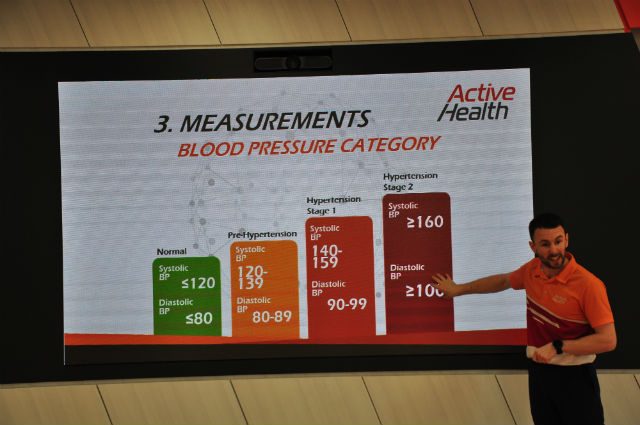
For the Sleep classes, these teach gentle restorative and yin yoga poses that are meant to relax the body, as well as a highly effective guided relaxation technique to help the body and mind to achieve a state of deep rest.
The Nutrition sessions teach you more about the type and benefits of healthier oil and tips on how to prepare a healthy YuSheng as well as how to choose lower sugar drinks and picking healthier snacks for the upcoming Chinese New Year season.
Such activities will be taking place simultaneously, in order to engage different groups of Singaporeans and possibly get them to mingle together.
Said Dr Chiang, “Many activities will be happening here at the same time – to connect all of the spaces within the complex. We hope that this can result in family bonding and the sharing of health data.”
He added, “The Heartbeat @ Bedok Active Health Lab is about more than just the physical infrastructure – the engagement of the people, will be the key to our success.”
Besides going through the on-boarding process, members of the media were taken on a tour of the Active Health Lab at the Heartbeat @ Bedok and we got to take a look around the actual spaces that will play host to these workshops and classes.
For example there is a mini kitchen where the nutrition classes will be taking place, as well as a little cosy space with a television screen in front, for the Sleep related classes.
Additionally, the Active Health Lab at Heartbeat @ Bedok also has an outdoor swimming pool which will be used for consultations, workshops and aqua programmes, too.
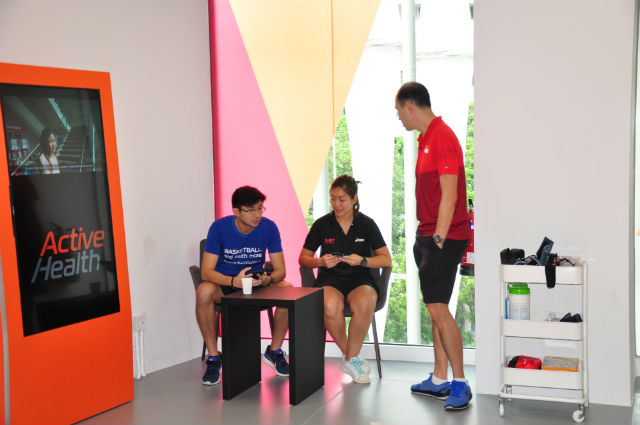
During our tour, members of the media got to take a look at this swimming pool and my first impression was that it definitely looked awesome – in fact I had been quite tempted to jump in and start swimming!
These Sessions will be made available for the public later this year
Do note that the Fitness Assessment Tests, themed classes and workshops will be available at the Heartbeat @ Bedok Active Health Lab from the second quarter of 2018.
If you want to find out more about the Active Health Lab, what it has to offer, or else to book a class when it becomes available, click on the MyActiveSG link here: https://www.myactivesg.com/active-health/lab

hi, I would like to book a slot for Age Related Muscle Loss Package-Assessment. Kindly advise. I am 72.
please get in touch with active health at https://www.activehealth.sg/contact-us to book your slot. thank you.